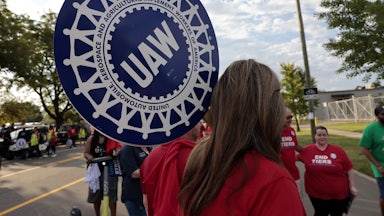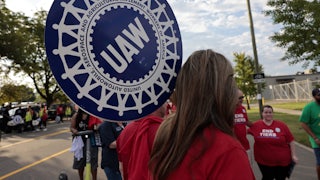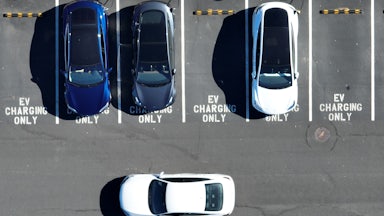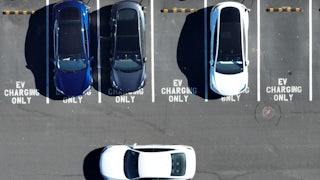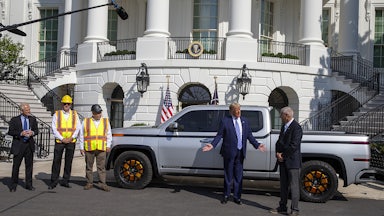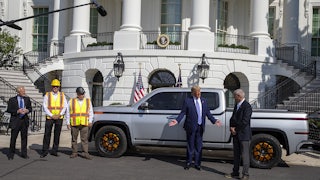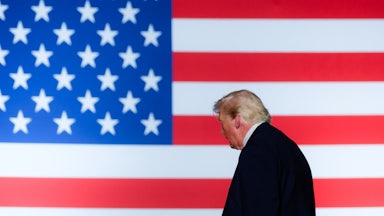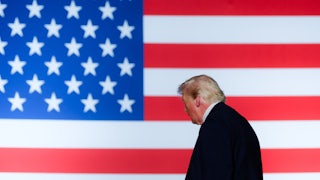Venture capitalist and U.S. Senator J.D. Vance has built a literary and political career on making opportunistic appeals to the plight of a working class he routinely describes as lazy, ungrateful slobs. His statements on the United Auto Workers’ now seemingly imminent strike against the Big Three U.S. automakers—Ford, General Motors, and Stellantis—have been no exception. Neither the American auto industry’s endless quest for profits nor the global economic forces shaping supply chains fit neatly into the box of standard GOP talking points. Vance and his colleagues, though, are trying as hard as they can to spin the contract dispute in their favor.
In a statement and thread posted yesterday on X, the website formerly known as Twitter, Vance starts off saying that he hopes both sides come to an agreement on a four-year contract in time to avoid a work stoppage, adding that “this moment of strife comes from the fact that American auto workers have gotten the short end of the stick.” From where might that stick have emerged, and who forced them to draw it? You have to work yourself into elaborate knots to say you “support the UAW’s demand for higher wages,” as Vance did, while exempting carmakers from any blame. (It makes sense that he’d be reluctant to criticize the Big Three: General Motors’ Political Action Committee donated $5,000 to Vance last year, including a $2,500 gift made after he had already won his Senate race.)
While CEO pay at the Big Three has increased by an average of 40 percent over the last four years, workers have seen just a 6 percent boost, behind the rate of inflation. Vance manages to thread this seemingly impossible needle by blaming not greedy CEOs for low wages but rather “the premature transition to electric vehicles.”
As I wrote earlier this week, the UAW has for months called attention to the fact that federal subsidies for electric vehicles—including those furnished by the Inflation Reduction Act—have helped finance automakers to build and expand nonunion facilities. Big Three companies have maintained that their joint ventures with foreign companies to build E.V. batteries aren’t subject to the master agreement being negotiated now, meaning the union needs to start from scratch to organize plants that (if a drive is successful) will then be subject to a separate collective bargaining agreement. That’s exactly what’s happened in Lordstown, Ohio, home to a factory operated by a joint venture between GM and South Korea’s LG Energy Solution, called Ultium Cells.
That’s not what Vance is concerned about, though. According to him, the real problem is that the Biden administration allegedly “sends billions” to “China’s electric vehicle industry every year.”
Contra Vance—who’s previously said that he supports collective bargaining “as an abstract matter”—the White House is not sending billions to China’s E.V. industry every year. A generous reading of Vance’s point is that China’s very real command over electric vehicle supply chains means that any policies that encourage drivers to go electric will enrich “the dirtiest economy in the world at the expense of auto workers in Ohio, Pennsylvania and Michigan.” Ford has also built a partnership to produce batteries in the United States with the Chinese firm CATL, which Republicans are seeking to fight.
Vance’s stance on electrification happens to be at odds with that of GM. “We believe the ambitious electrification goals of [President-elect Biden], California, and General Motors are aligned, to address climate change by drastically reducing automobile emissions,” GM CEO Mary Barra said in 2020, long before the Inflation Reduction Act passed. Such statements haven’t stopped the company from continuing to donate prolifically to Vance and other Republicans who oppose climate policies across the board. Still, it’d be hard to make the case that the White House is somehow forcing the industry to comply with electrification, as Vance seems to suggest.
The administration’s most muscular E.V. policies aim to do precisely the opposite of sending money to China. IRA incentives for electrification are hyper-focused on excluding products from China and any other “foreign entity of concern” and enriching domestic automakers by reshoring production in the U.S. In order for plug-ins to qualify for the IRA’s $7,500 consumer rebate, they need to be assembled in the U.S. Forty percent of the minerals used to power their batteries need to be sourced from the U.S. or from a country with which it has a free trade agreement. Fifty percent of battery components need to meet the same criteria. Each of those requirements ramps up by 10 percent every year. The U.S. also imposes a steep 27.5 percent tariff on Chinese-made cars.
Incentives for E.V.s, Vance charges, are a front in Biden’s “war on American cars.” If anything, though, policies to exclude foreign components in the name of outcompeting China may be too strict, at least if the goal is to get more E.V.s on the road; since U.S. E.V. manufacturing capabilities are so far behind other countries’, relatively few cars actually qualify.
The scenario Vance imagines is one in which U.S. automakers simply opt out of electrification, ignore the growing global demand for E.V.s—including in countries with mandates to phase out gas-powered cars—and cede the rapidly growing global market for E.V.s to other countries, including China, while American automakers get left behind, continuing to make products their competitors are ditching.
There are other reasons why Vance is so down on climate policy. He’s one of Congress’s biggest recipients of donations from oil companies, which have a vested interest in ensuring as many gas-powered cars stay on the road as possible. During the 2022 election cycle, he collected more than $287,000 from industry-linked PACs and individual donors who contributed more than $200. The Senate Leadership Fund, which spent generously on Vance’s race last year, collected $4 million from Occidental Petroleum, $2.75 million from Chevron, $1.5 million from Koch Industries, and $1 million from the American Petroleum Institute.
A 2021 financial disclosure also showed that Vance had between $100,001 and $250,000 parked in a mutual fund that invests in crude oil futures; by 2022 he had decreased that amount to between $50,001 and $100,000.
As he did in his race for the Senate, Vance is mostly parroting talking points from Donald Trump, who has recently urged UAW members to somehow both stop paying their dues and make “the complete and total repeal of Joe Biden’s insane Electric Vehicle [sic] mandate their top, non-negotiable demand in any strike.” (There is no “Electric Vehicle mandate.” As the UAW is not negotiating with the president but rather car companies, such demands cannot be made at the bargaining table.)
Though Trump and Vance have staked their claim on blaming Democratic climate policy for autoworkers’ troubles, they could find it difficult to convince acolytes who see the industry as too far gone down the chasm of woke ideology. A strike, that is, could test the right’s commitment to its war on environmental, social, and governance investment criteria, or ESG. Historically, Republicans have opposed unions and strikes and sided with employers, especially those that donate generously to them. But what if said employer has contracted the woke mind virus? Is an enemy of your enemy not a friend?
Conservatives, including YouTube pundit Dave Rubin, already targeted Ford earlier this summer after the company made a Pride ad featuring a rainbow Raptor. Consumers’ Research—one of the main groups backing the GOP’s anti-ESG push—has issued a “Woke Alert” on Ford. “The brand that revolutionized car manufacturing and delivered world class muscle cars like the Shelby Mustang has gone woke,” a page on the group’s website reads. “Their European division, bowing to the woke forces of ESG, pledged it was going full electric by 2030.” The site goes on to offer readers a number to the company’s headquarters to complain that “tax dollars shouldn’t be used to finance Ford’s woke agenda.”
While Vance claims to speak for UAW members (“Most auto workers understand that Biden policies are destroying the American car industry”), the union’s first-ever directly member-elected president, Shawn Fain, has straightforwardly rejected attempts to pit workers against climate priorities. “The electric vehicle future must be union made. We can have both economic and climate justice—and that starts by ensuring that the electric vehicle industry is entirely unionized and that EV jobs come with union standards,” Fain wrote in an op-ed for The Guardian on Thursday, co-authored with California Representative Ro Khanna. “Forcing workers to decide between good jobs and green jobs is a false choice. We can and must achieve both—and it can start with a fair contract for UAW autoworkers.”

